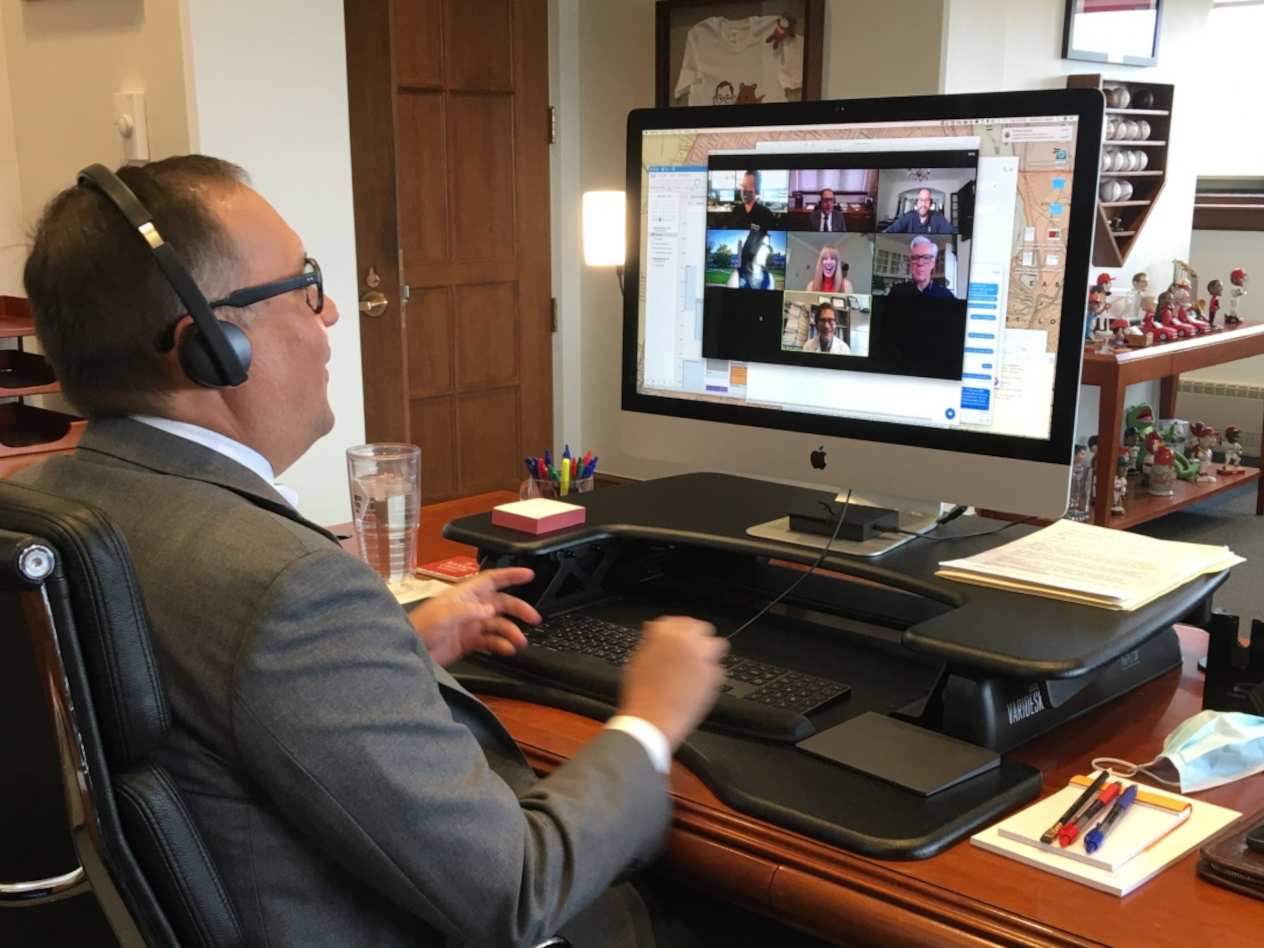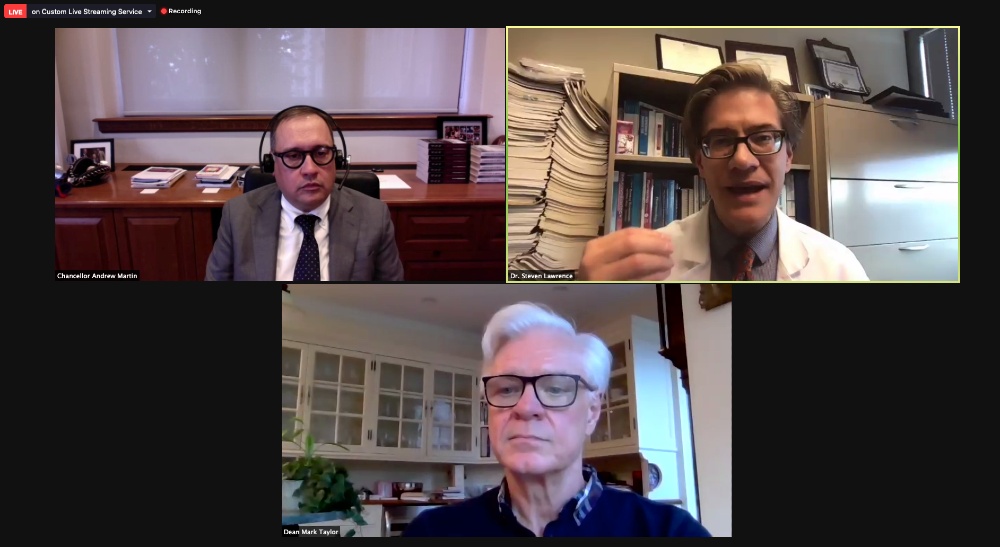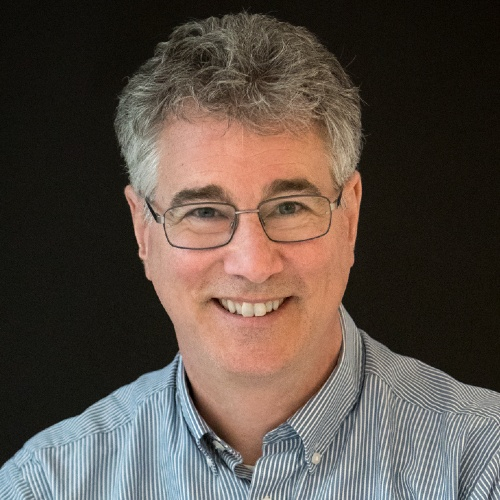Leading through crisis: Chancellor shares values-based choices in a time when data was scarce
- October 1, 2020
- By Kurt Greenbaum
- 3 minute read

By late February, the scope of the crisis was clear to WashU Chancellor Andrew D. Martin. Within the week, the St. Louis region saw its first case of COVID-19. Days later, students departed for spring break. By March 9, the decision had been made. Students wouldn’t be returning. The campus was closed.
By late February, the scope of the crisis was clear to WashU Chancellor Andrew D. Martin. Within the week, the St. Louis region saw its first case of COVID-19. Days later, students departed for spring break. By March 9, the decision had been made.
Students wouldn’t be returning. The campus was closed.
With clinical precision, Chancellor Martin and the WashU Med School’s Dr. Steven Lawrence gripped viewers with the tale of how mounting concern for public health, the fear of overstretching hospital resources, the reality facing university income and the imperative to safeguard students converged in a series of rapidly made decisions.
“Those were very fraught times,” Martin said via Zoom in Olin’s first Leadership Perspectives presentation of the school year. “We had to make a decision about what would be the right thing to do for our students. This was very unpopular. There was one case in Missouri. Lots of people thought we were overreacting.”
Martin and Lawrence tossed the storytelling back and forth as they walked viewers through the weeks, weaving the administrative and educational implications of the process together with growing public health worries and solution-oriented research that began almost immediately.
Chancellor Martin acknowledged Olin’s values-based, data-driven approach to decision-making in his presentation, “Leading during COVID-19.”
Short on data, long on values
While he noted that data was in short supply in those earliest days, the values guiding the decision-making process came together quickly. They included the safety and security of the university and beyond; remembering WashU’s mission focused on education, research and patient care; protecting lives; acknowledging the diversity, equity and inclusion implications of the crisis; innovation and collaboration; accountability and transparency; and careful stewardship of resources.
“It was remarkable how quickly big decisions were made,” said Lawrence, an infectious disease specialist at the medical school who has been central to the university’s planning process and an oft-quoted resource in the media. “It was eye-opening how those big decisions can be made very decisively based on the values you described.”
For members of the WashU community, many of those decisions are familiar. A hiring freeze. Furloughs for 2,000 employees, most from the medical school after elective procedures were canceled. Packing and shipping students’ belongings from their now-vacant dorms. Refunding room and board fees. Canceling the university match on employee retirement contributions. Exclusive online learning to close out the spring semester. Delaying the start of the fall semester.
The reality of the next year
After the initial pivot in spring, Martin said, the university immediately had to turn to budgeting for a the 2021 fiscal year—a process that started by throwing out the previously considered budget. The university had to retrench from an anticipated $3.9 billion in revenue to $3.4 billion, demanding operating cuts of half a billion dollars.
Meanwhile, Martin stood up a 150-member planning team for the fall semester—a web of interrelated task forces and subcommittees focused on everything from how space would be allocated to how COVID-19 testing would be deployed, from housing infected students to creating on-campus space for eating, studying and virtual classrooms, from jump-starting research to providing meal service.
We did not have the gift of time in March.
Andrew D. Martin, WashU chancellor
Delaying the fall semester start until September 14 provided a cushion for the planning team. The chancellor said the entire community benefitted because the process leaned then—and continues to lean—on a values-based system of decision-making that “tapped the expertise of our faculty to tackle some thorny issues in a comprehensive and consultative way.”
Pictured at top: Chancellor Andrew D. Martin from his office, engaging viewers through Zoom during his Leadership Perspectives presentation for Olin on September 29, 2020 (photo/Nancy Lyons).
Leading during COVID-19 | Leadership Perspectives
Join us for a fireside chat with Chancellor Andrew Martin and Dr. Steven Lawrence, infectious disease expert from the School of Medicine.
Media inquiries
For assistance with media inquiries and to find faculty experts, please contact Washington University Marketing & Communications.
Monday–Friday, 8:30 to 5 p.m.
Sara Savat
Senior News Director, Business and Social Sciences

